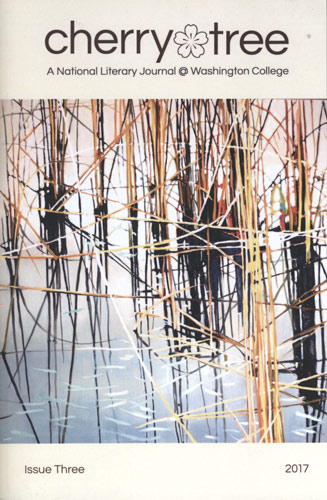Cherry Tree – 2017
The annual literary magazine Cherry Tree was founded three years ago by Maryland’s Washington College. Several longer stories dominate their plump 2017 issue, one of which is R.M. Fradkin’s stand-out “Out-of-Office.” If you have ever been frustrated by your email system, you will identify with her story-in-reverse about a librarian named Shavani and a gentleman, Valentine Izzo, who has an overdue library book.
The annual literary magazine Cherry Tree was founded three years ago by Maryland’s Washington College. Several longer stories dominate their plump 2017 issue, one of which is R.M. Fradkin’s stand-out “Out-of-Office.” If you have ever been frustrated by your email system, you will identify with her story-in-reverse about a librarian named Shavani and a gentleman, Valentine Izzo, who has an overdue library book.
The story hinges on Izzo’s message saying, “I am traveling and may not have access to email.” He and Shavani establish a relationship of sorts as they correspond about the overdue fine and about matters unrelated to library business. Even after Shavani learns of his whereabouts and final destination, she can’t help correcting his grammar. Izzo writes, “It’s all that’s left of a once profitable business, which my partner cut me out of.” Her response in bright red ink: “There is also the slight issue of ending sentences with prepositions, but let that pass.”
Michael Chin’s story, “Mixed Tag,” includes five related pieces about a mixed tag team wrestling match and a female wrestler called Dragon Princess: “Next thing I knew, she got me in her choke. [ . . . ] I sold like I was in agony. Hammed it up a little because the crowd would get a kick out of this little girl beating down a man nearly twice her body weight. Only, before long, I wasn’t selling.” Believe it or not, this mini-tale has a nice, soothing ending.
But there is a whole lot of violence and misery going on elsewhere in these pages. Julie L. Moore’s poem “PTSD” paints a graphic picture with lines like these:
The therapist also says to revise
the script of her recurring nightmare,
take the six-foot figure of her husband
barreling into her as she tries to hold
every door, laughing at her when she says,
You are scaring me [ . . . ]
& turn it into a kitten,
reduce his ridicule to one meager
meow.
Michael Walsh’s poetry takes a different tone, and his feelings come through loud and clear in his sequence of poems. They begin with the startling opener, “The Likely Darkness”:
The day of the strangulation, I went to the green phone
[ . . . ] picked up the receiver and rested
my pointer finger on its zero. But I couldn’t imagine
rescue.
Walsh continues in “On the Thirtieth Anniversary of My Resurrection”:
Soon will arrive my lonely birthday,
the day my stepdad choked Mike, the nameI no longer use, the boy who suffocated
into unknowable darkness.
He ends his series with the unforgettable “Sex with Jesus.”
For an unexpected mix of seriousness and humor, be sure to read Nan Byrne’s “Sorry for Your Lost”:
There’s a fire at the morgue
and although no one is in danger of dyingwe practice our lifesaving
on the ungrudging corpses[ . . . ] who now gather in the hospital courtyard
defrosting like Sunday halibut
Then there is Erika Meitner, who situates her poem “Bread & Peace” in Belfast, Northern Ireland. She writes:
My son
is learning to speak here, says certain words
in ways I don’t recognize. More is mo-weigh.Now has become nigh. We are only visiting,
so his accent—tuneful, rising—will vanish [ . . . ]”
That sweet thought is followed by the other side of the coin:
There is danger here,
but we are not in it. Proximity is always relative,and I keep walking and walking, past Lavery’s Bar,
where a muscled armored truck driver is headed inside,wearing full helmet with tinted visor, blue bulletproof vest,
steel briefcase handcuffed to his wrist.
Don’t overlook the nonfiction in Cherry Tree. In the 1980s, the German writer Friedrich Dürrenmatt wrote his novel The Assignment by having each of the 24 chapters consist of one extremely long sentence. Others like Laird Hunt, William Faulkner, and Bohumil Hrabal have embraced the very long sentence. Here, Tyler Mills employs that style with her nonfiction piece titled “Body,” which starts out:
Monday, and children were walking through the streets, plastic packs on their backs like oxygen tanks for the Moon, [ . . . ] and the rumor suddenly wore its vowels and consonants loudly, body, the children said, body, and then I heard parents say, body in the back of a pickup truck [ . . . ]
The piece continues on in this way for three pages, still readable in its format.
Kate Anger uses her essay “Command of His Pistol” to seamlessly blend her theater gig as Lady Croom in Tom Stoppard’s play Arcadia with learning about her father’s suicide. And Rajiv Mohabir takes us for a ride on the “E Train to Roosevelt Making All Local Stops in Queens.”
Please do not be dissuaded by the adversities you will encounter in Cherry Tree. There’s so much originality in this volume. Each piece reveals a look at some aspect of life, perhaps not yours, but perhaps about the person across the way. And each voice is alluring, accomplished, and engaging.
[www.washcoll.edu/centers/lithouse/cherry-tree]





